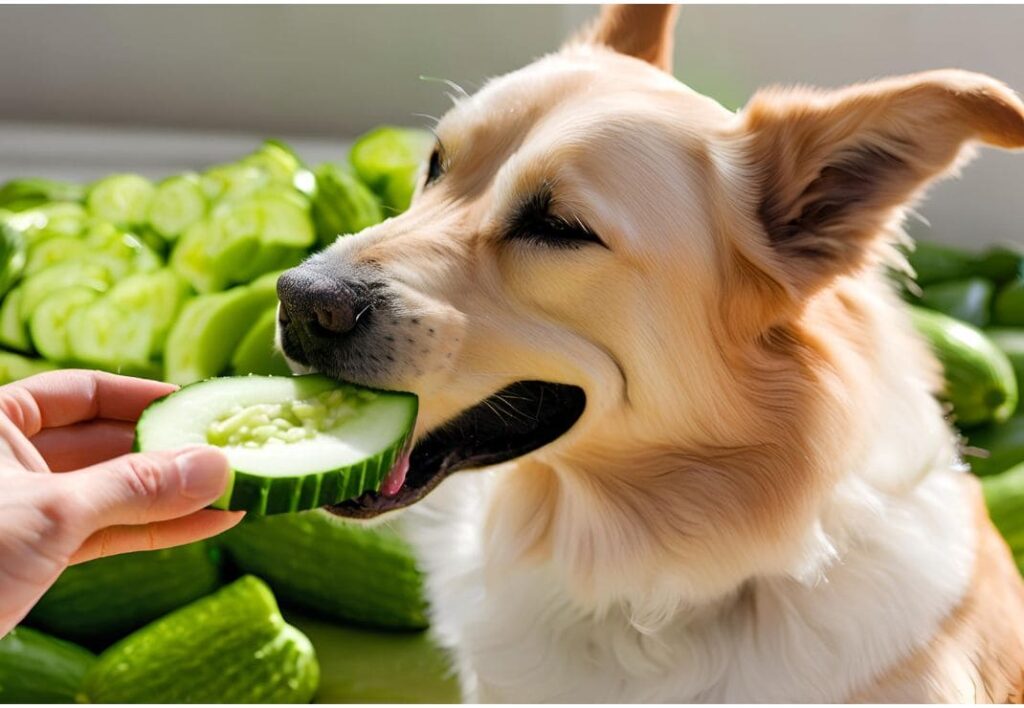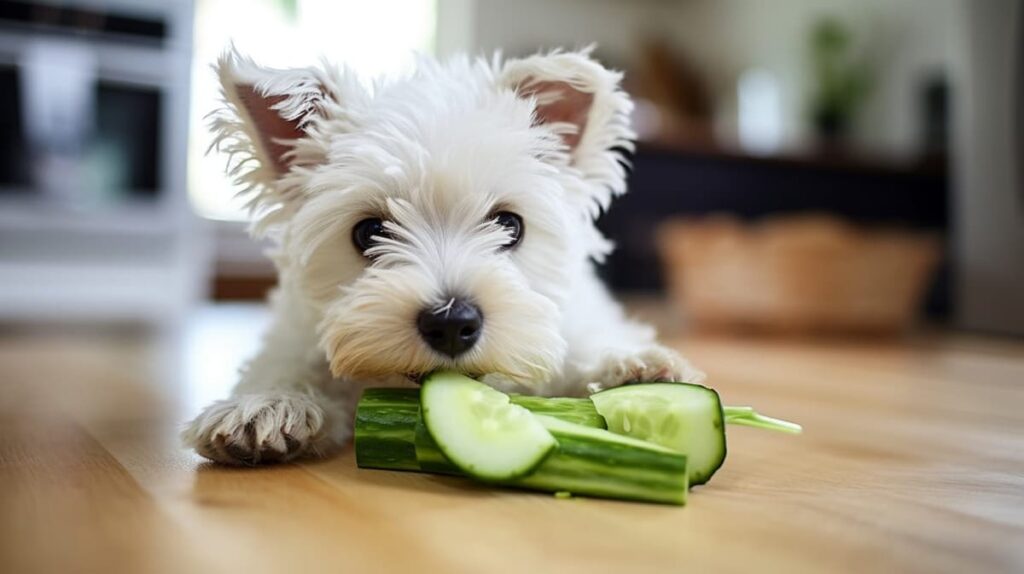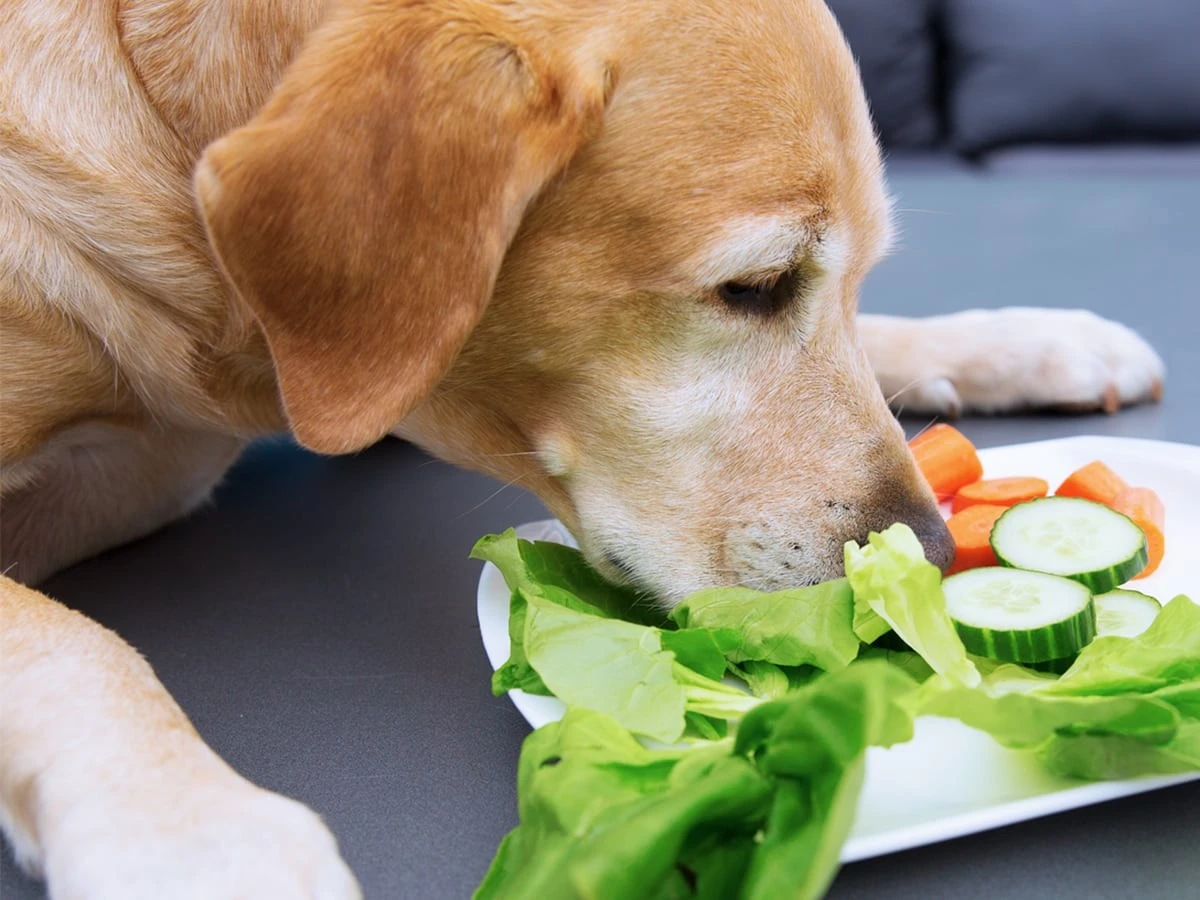Can dogs eat cucumbers, as pet owners, we always want to ensure that our furry friends are consuming safe and healthy foods. One common question that arises is, “Can dogs eat cucumbers?” The short answer is yes, dogs can eat cucumbers. However, there are important considerations to keep in mind when feeding this refreshing vegetable to your canine companion. This article will delve into the benefits, potential risks, and best practices for incorporating cucumbers into your dog’s diet.
Nutritional Benefits of Cucumbers for Dogs
Can dogs eat cucumbers, Cucumbers are a low-calorie, nutrient-rich snack that can be a great addition to your dog’s diet. Composed of about 95% water, cucumbers are excellent for hydration, especially during hot weather. They are also low in fat and contain essential vitamins and minerals, including vitamin K, vitamin C, magnesium, and potassium.
When asking, “Can dogs eat cucumbers?” it’s important to note that the antioxidants in cucumbers can help combat free radicals in your dog’s body, potentially reducing the risk of chronic diseases. Additionally, the fiber in cucumbers supports healthy digestion, making them a suitable snack for dogs prone to gastrointestinal issues.

How to Safely Feed Cucumbers to Your Dog
While cucumbers are generally safe for dogs, there are a few guidelines to follow to ensure they are consumed safely. First, always wash cucumbers thoroughly to remove any pesticides or chemicals on the skin. Next, slice the cucumber into small, bite-sized pieces to prevent choking hazards.
When introducing cucumbers into your dog’s diet, start with small amounts to ensure they don’t have an adverse reaction. If your dog enjoys cucumbers and digests them well, they can become a regular treat. However, moderation is key. Overfeeding cucumbers, like any other treat, can lead to digestive issues such as diarrhea or an upset stomach.
Potential Risks of Feeding Cucumbers to Dogs
While cucumbers are safe for dogs, there are some potential risks to consider. One common concern is the possibility of digestive upset if cucumbers are given in large quantities. Because cucumbers are high in water content, excessive consumption can lead to loose stools or diarrhea.
Another point to consider is the cucumber’s skin. While the skin is edible, it can be tougher for some dogs to digest, particularly smaller breeds or those with sensitive stomachs. If your dog has trouble digesting the skin, it may be best to peel the cucumber before serving it.
Lastly, some cucumbers can be bitter, especially those that have been left to grow too long. Bitter cucumbers contain cucurbitacins, compounds that can be toxic to dogs in large amounts. Although it’s rare, it’s best to avoid feeding your dog cucumbers that taste particularly bitter.
Can Dogs Eat Pickles Made from Cucumbers?
A related question that often arises is, “Can dogs eat pickles made from cucumbers?” While pickles are made from cucumbers, they are not recommended for dogs. Pickles are typically soaked in a brine solution containing vinegar, salt, and various spices, which can be harmful to dogs. The high sodium content in pickles can lead to salt poisoning, while certain spices, like garlic and onion, are toxic to dogs. Therefore, it’s best to stick to fresh cucumbers when offering your dog this snack.

Alternatives to Cucumbers for Dogs
Can dogs eat cucumbers if your dog isn’t a fan of cucumbers or you want to mix up their snack options, there are several other fruits and vegetables that are safe for dogs. Carrots, for example, are another low-calorie, crunchy snack that many dogs enjoy. They are rich in beta-carotene, which is good for your dog’s vision and immune system.
Apples are another healthy option, providing vitamins A and C, as well as fiber. Just be sure to remove the seeds and core before offering them to your dog. Green beans and zucchini are also excellent alternatives that provide a similar crunchy texture to cucumbers.
How Cucumbers Fit into a Balanced Diet
When considering “Can dogs eat cucumbers?” it’s important to remember that while cucumbers are a healthy treat, they should only be a small part of your dog’s overall diet. A balanced diet for dogs includes a mix of high-quality dog food that provides the necessary nutrients, proteins, fats, and carbohydrates your dog needs to thrive.
Cucumbers and other fruits and vegetables should be viewed as supplements to this diet, offering variety and added nutrition without replacing your dog’s main meals. Treats, including cucumbers, should not make up more than 10% of your dog’s daily caloric intake to maintain a balanced and healthy diet.
Incorporating Cucumbers into Your Dog’s Routine
Can dogs eat cucumbers there are various ways to incorporate cucumbers into your dog’s routine beyond just offering them as a simple snack. You can mix small pieces of cucumber into your dog’s regular food for added texture and nutrition. On hot days, consider freezing cucumber slices to create a refreshing, hydrating treat.
Another idea is to use cucumbers as training treats. Their low-calorie content makes them an ideal reward for dogs who are on a diet or need to watch their weight. The crunchiness of cucumbers can also be satisfying for dogs, making them an appealing training tool.
Can Cucumbers Improve Your Dog’s Dental Health?
Can dogs eat cucumbers in addition to being a low-calorie snack, cucumbers may also contribute to better dental health for your dog. The crunchy texture of cucumbers can help reduce plaque buildup by gently scraping against your dog’s teeth as they chew. While cucumbers shouldn’t replace regular dental care like brushing or professional cleanings, they can serve as a natural way to promote oral hygiene. If you’re asking, “Can dogs eat cucumbers to support their dental health?” the answer is yes, but always in conjunction with a comprehensive dental care routine.
Conclusion: Can Dogs Eat Cucumbers?
In summary, “Can dogs eat cucumbers?” Yes, they can! Cucumbers are a safe, healthy, and refreshing treat for dogs when fed in moderation. They offer numerous nutritional benefits, including hydration, essential vitamins, and antioxidants. However, it’s important to introduce them gradually, monitor your dog for any adverse reactions, and serve them in appropriate portions.
By following these guidelines, you can confidently add cucumbers to your dog’s treat repertoire, knowing that you’re providing a snack that supports their health and well-being. Whether you’re looking for a low-calorie treat or a hydrating snack on a hot day, cucumbers can be a fantastic addition to your dog’s diet.
Also read: The Rise of the Human Dog Bed: A New Trend in Comfort





